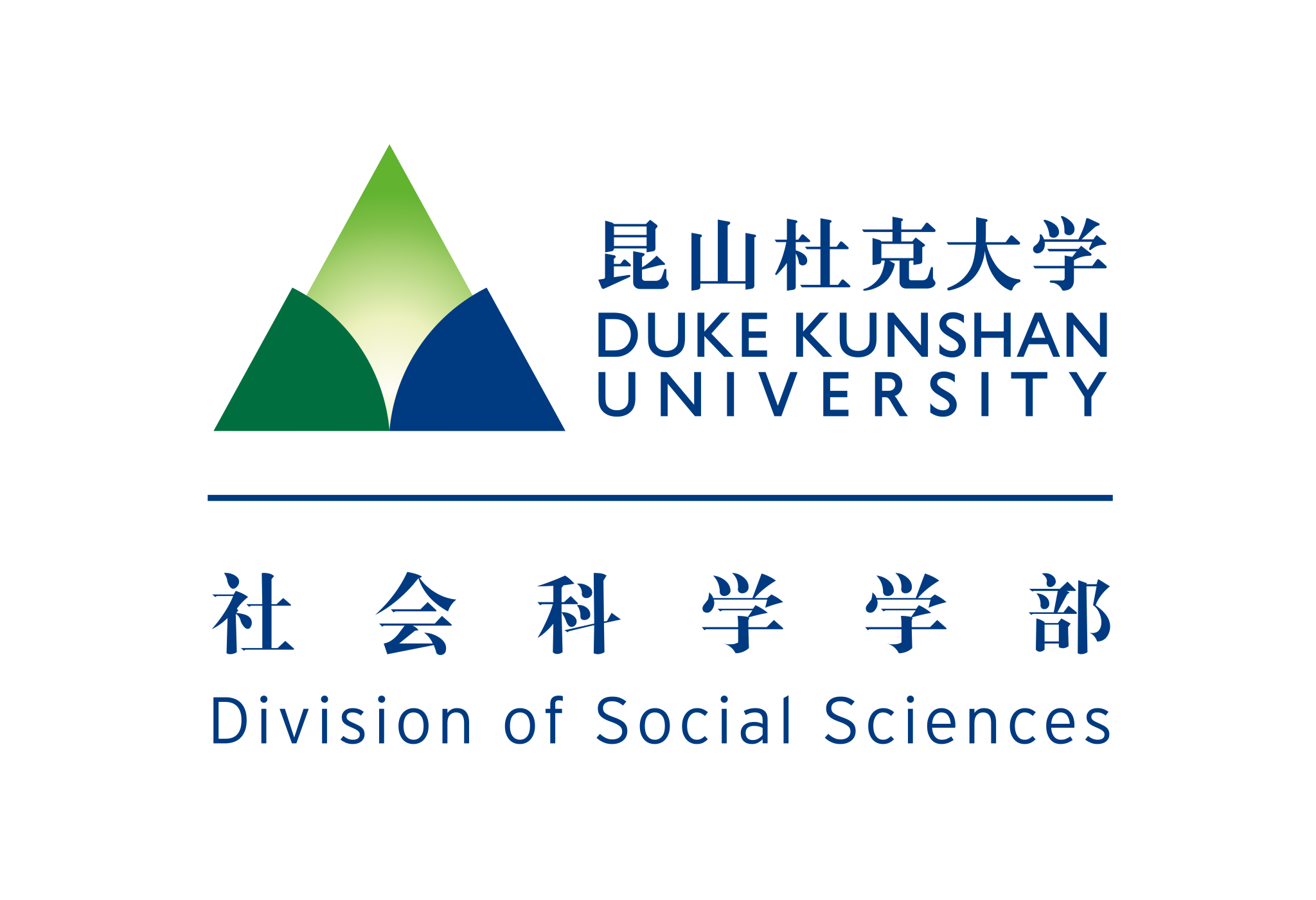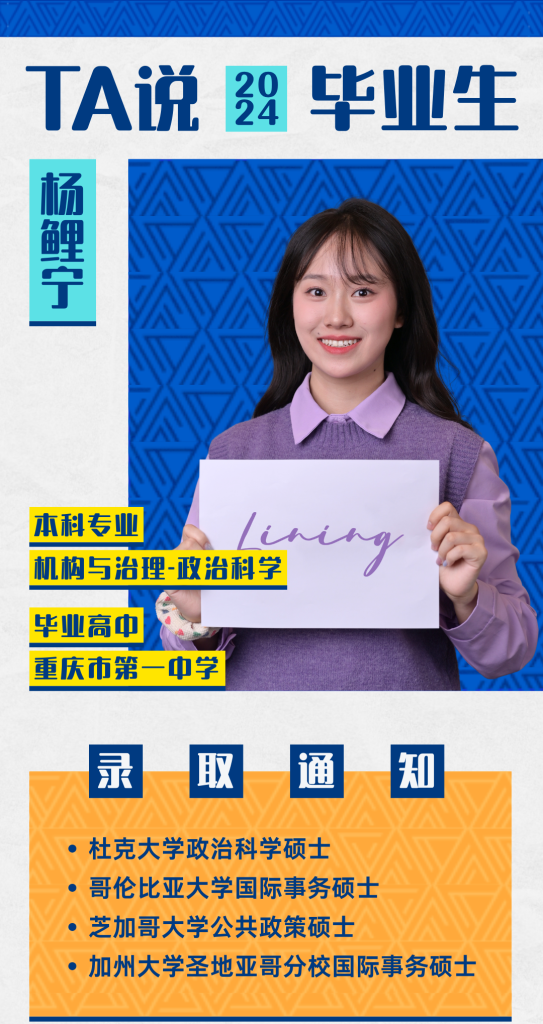
01 Why DKU?
In the sophomore year of high school, I had the desire to go abroad for postgraduate study, and my parents were very supportive. Therefore, Chinese-foreign joint universities became a very suitable option for my undergraduate study.
Based on the knowledge of two well-known universities, Duke University and Wuhan University, my family and I believe in the teaching quality of DKU. In addition, DKU’s all-English teaching can provide me with a long-term and international platform to prepare for my future overseas study. In addition, DKU’s Liberal arts education can also give me great possibilities professionally.
As a junior high school graduate, although I have developed an interest in international relations, it mostly came from interesting diplomatic stories or casual anecdotes. I didn’t know what kind of knowledge is behind those fancy major names — I can’t tell finance from economics, public administration from public relations, journalism from communication…… And DKU can give me two years to figure out what I’m really interested in!
02 My Story About My Major
At the very beginning, I chose a lot of courses related to international relations according to my interests, such as Introduction to Political Science, Global China, etc. At the same time, I also tried to jump out of my comfort zone and took elective courses such as Economics, History, and Public Policy. But after exploration, I found that I like Political Science most.
The study of Political Science has made me experience the satisfaction of bridging the “two veins of responsibility and supervision” many times. When I read article before class, or discuss an event with the teacher in class, I suddenly realize that this knowledge point connects all the previous knowledge points, as if I were searching for the light bulb along the tangled wires in the dark night sky.
Finally, after discussion with my Academic Advisor, I chose Political science With institutions and governance Track. The undergraduate study expanded my cognition and helped me realize that diplomacy is not only about dealing with people, but also about system and strategic deployment at the macro level, and it is an art that combines the rule of people and the rule of law.
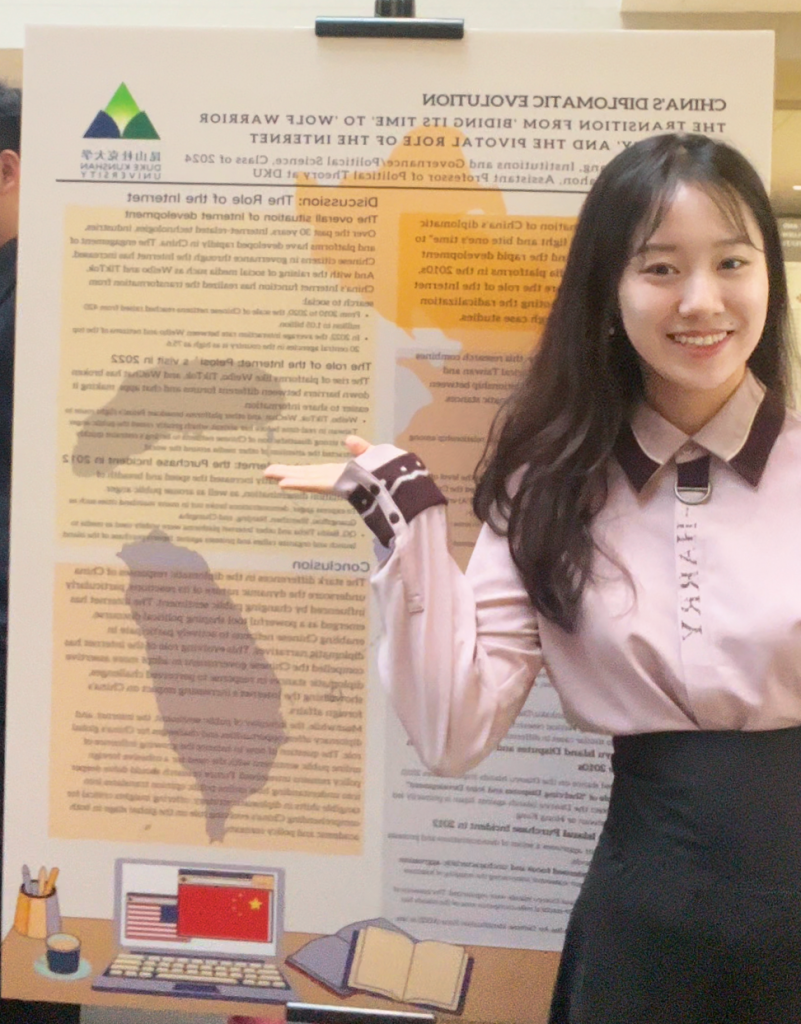
Signature Work Performance
03 Significant Academic Practice
Until I actually studied and practiced, I always thought diplomacy was a science that sounded “cool,” and the picture that came to my mind was probably diplomats hammering out the world. But my research and internship experience at DKU connects this metaphysical diplomacy with actual poverty alleviation.
The first time I intuitively encountered “poverty” was a volunteer teaching activity in high school. At that time, I could not imagine that behind the “now the clothes are wet, let your grandma send you a new clothes”, the old man of nearly 70 years old shuttled through the rugged mountain road for a whole afternoon.
After entering the university, my first scientific research project was to follow Professor Pippa Morgan to study China’s medical aid to Africa, so I looked up and sorted out a lot of background information and data. Through this experience, I discovered that there are many places in the world where poverty brings about all kinds of inequality.
In the second semester of my sophomore year, I had the opportunity to work as an intern in China Foundation for Poverty Alleviation (renamed China Rural Development Foundation since 2022). Different from the state-led poverty alleviation assistance studied during the research period, during this internship, I saw the contribution of many social enterprises and public organizations to domestic poverty alleviation, including talent training, industrial support, science and education development of agriculture, etc. Poverty alleviation is not only a matter of the government, and the participation of new roles like social enterprises can provide more motivation and ideas for poverty alleviation.
In the first semester of my junior year, in Professor Pippa Morgan’s Political Science class, I discussed with her whether China’s targeted poverty alleviation model could be applied to other countries in the world. In order to further deepen my understanding of relevant policies, I deeply studied the classic case of China’s targeted poverty alleviation – eighteen Holes Village. Shiba Dong Village is located in the Tujia and Miao Autonomous Prefecture of Xiangxi, Hunan Province. The terrain is complicated, the traffic is difficult, the land is barren, the cultivated land is scattered and loose, and the soil erosion is serious. At the same time, it is located at the junction of many provinces, and the administrative power and obligations are unclear, which further aggravates the difficulty of poverty alleviation in this area. China has adopted a series of supporting measures to solve local problems, carried out large-scale infrastructure construction, and introduced a large number of young and excellent civil servants to grassroots work, which has greatly reduced the average age of party and government workers there. Therefore, I extended the discussion in class and conducted more systematic research after class. Finally, I wrote my findings into a paper and published it at the International Conference on Global Politics and Social Humanities in 2023.
Wittgenstein said: “I stick to the ground, not dance in the cloud”. Whether I follow the professor to trace the details of the medical assistance in Central Africa or independently study the precision poverty alleviation model in China, the DKU platform gives me a pragmatic perspective to observe the “lofty” concept of international relations, and also gives me the opportunity to test my knowledge in practice and sum up experience from practice.
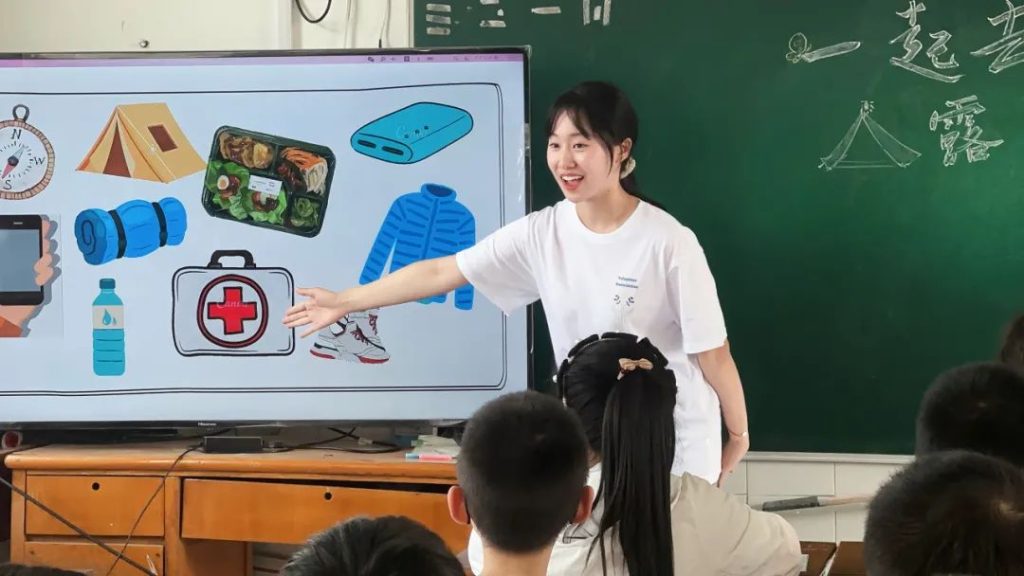
Volunteer teaching photos
04 Impressive Memory In Duke
Duke in my memory is a utopian existence, because I was lucky to make a group of wonderful and lively friends there; Those days were also very pure. After going through the arduous adaptation stage in my freshman year and the accumulation stage in my sophomore year, I had increasingly clear goals in my junior year: to maintain a stable GPA, obtain TOEFL scores and experience local life deeply.
In Duke Spring, I really had the romantic life I read about in movies and novels. We camp in tents in our dorms, we picnic on the grass on Wednesday of final week, watch a new movie on any Friday and talk all night; We randomly gathered, accompanied by guitar singing Jay Chou, Chen Granule…… At Duke, I seem to have learned what is called a “sense of relaxation”, perhaps because of the bright spring, perhaps because I know that the road is under my foot, so that I can be unfettered.
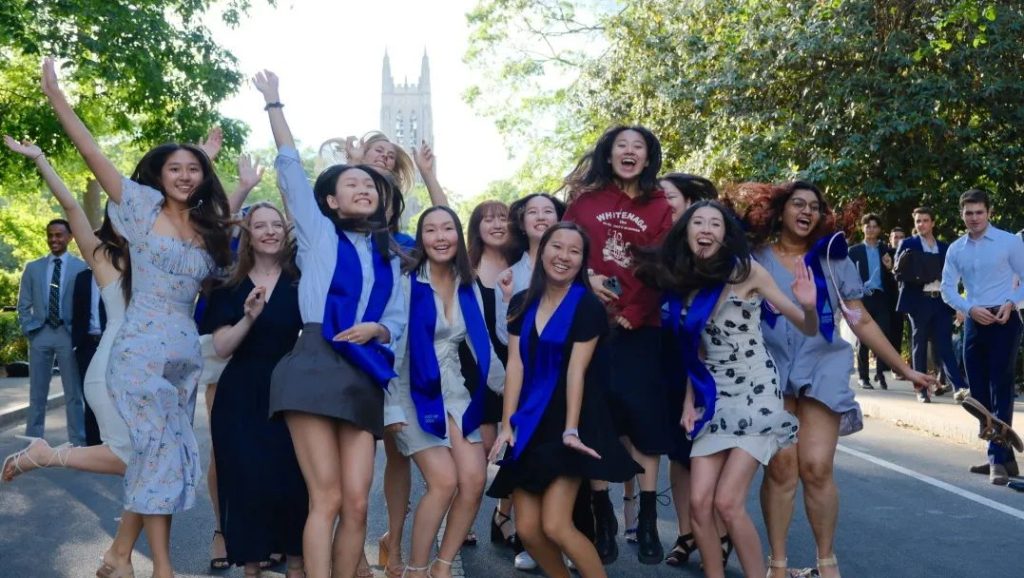
At Duke to attend the graduation ceremony of the senior sisters
Of course, pure days are not all joy, there are also daunting challenges. Although I have heard about the Middle East in various international news, my systematic understanding of the Middle East is still as blank as a sheet of paper. So, during my semester at Duke, I took an advanced specialized course on U.S. policy and Middle Eastern politics, hoping to fill in the gaps. The reading was so heavy that the average reading before each class was 400-500 pages, and participation was 50% of the grade. I was the only “international student” in my class, and my classmates’ knowledge was much richer than mine, so I was under great pressure in that course. Halfway through the semester, I remember asking my professor for an assessment of my class participation, and even though I spoke up at least once in every class, the Professor still felt that I was “barely involved.” After receiving his reply, I even felt a little upset. Considering that I would soon start applying for graduate school, I was very worried that the score of this course would affect my GPA.
At this time, my Academic Mentor Professor Lindsay gave me great emotional support. At the same time, under her advice, I confessed to the professor the difficulties I met in the learning process, and hoped that the professor could recommend some targeted books. Then I cut short my spring break trip to catch up on some background. Fortunately, during the spring break, Iran and the Arab States re-established diplomatic relations under the mediation of China. After the holidays, the focus of class discussion changed rapidly, with the professor asking me specifically for my views in each class, and my classmates taking turns analyzing China’s successful diplomatic initiatives in their final reports, from not being clear about China’s role in Middle East policy. This course not only honed my personal learning and expression ability, but also made me feel the power of diplomacy again as a Chinese student.
05 Why Love DKU?
My love for DKU comes first and foremost from my respect for the professors. I am very grateful to Professor Lindsay, my Academic Advisor. She is the best Advisor in the world. In the past four years, we have maintained a very close contact. She never judges my doubts and anxieties but always puts me in my perspective and gives me full emotional support and reasonable suggestions from my point of view. Professor Pippa is also a professor who has had a great influence on my undergraduate career. In the communication with her, I gradually learned that Pippa had gone to Africa alone to do field research during her doctoral study. After working, she regularly participated in marathons and taught with self-discipline, self-confidence and rigorous academic attitude. I am greatly inspired by the strength of female academics in Professors Lindsay and Pippa.
Secondly, DKU has made me a better person. During these four years, DKU provided me with a wealth of resources that encouraged me to continue to strive for progress: the WLS and Professor John Harper to revise my paper word-for-word; Set “speaking goals” for Myself, from having to speak once per class, to two or three times, to having an in-depth discussion with the professor on a topic. In the four years, I often feel peaceful because I choose DKU, after all, as Wang Meng said in “Long Live Youth”: “Besides students, who can feel their own progress so clearly?” The complete story line formed by my research and practice in the field of international relations and poverty reduction has also become my advantage in the application stage.
More importantly, DKU’s respect for and advocacy of diversity also let me see more possibilities for myself. At DKU, I heard more new and bold ideas, understood more new ways of thinking, generated more thinking, and met a variety of people. Everything and everyone I’ve experienced at DKU has helped me learn more about the world and inspired me to live my life in the future. In the open and inclusive atmosphere of DKU, I did get a lot done. DKU has protected my dreams and made me who I am.
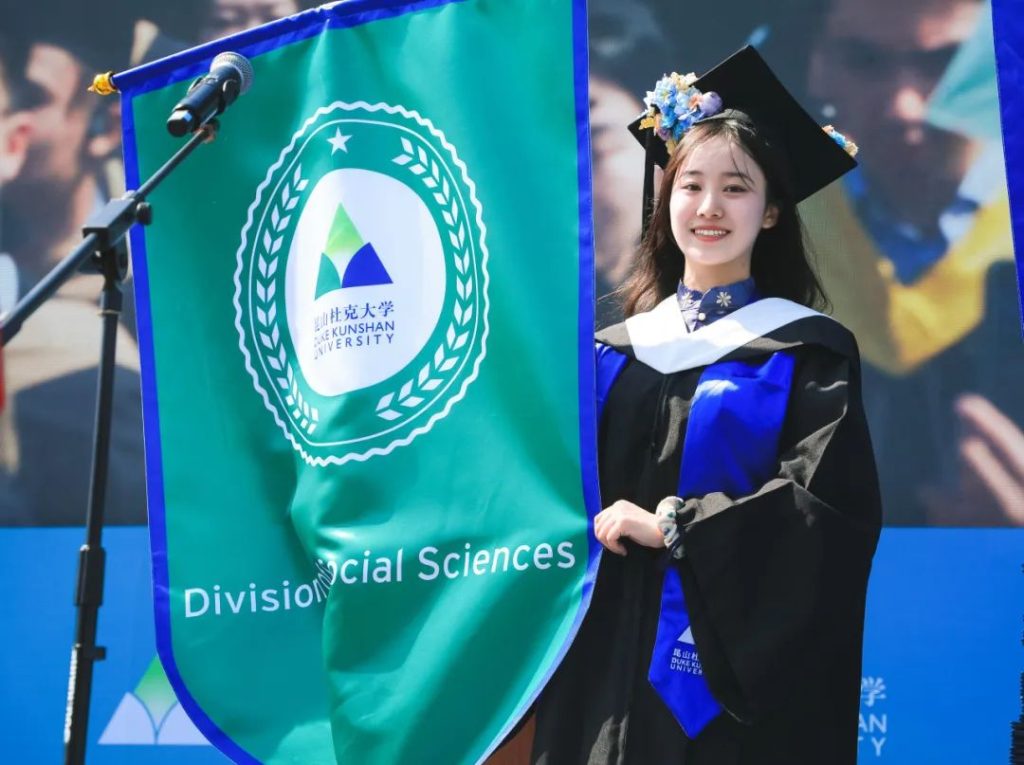
Honorary graduation flag bearer
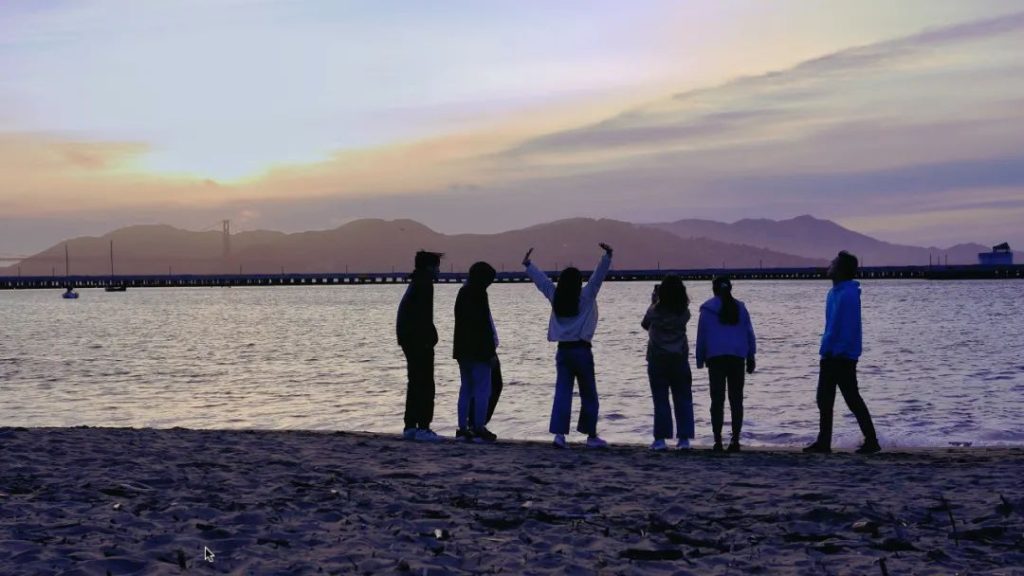
Good friends in San Francisco
06 Plans After Graduation?
After graduation, I will go to Columbia University to study for a master’s degree in International Affairs. On the one hand, I conform to my original interest in international relations; Because Columbia is located in New York, there are more job opportunities. I hope to go there to further explore and determine my future career choices.
07 Suggestions To Fellow Students
Before entering DKU, I used to think that the phrase “life is a wilderness” encouraged us to broaden the breadth of life and explore the possibilities of life. But four years later, I found that this phrase can also be understood as “life is a wilderness, but man is a river”, and the river does not stop flowing because of an unexpected turn. So if the goal is clear, in fact, there is no so-called “straight road” and “detours” difference, all experiences will become your precious wealth in life.
Translated and Edited by Zhenyu Tian, Class of 2027
